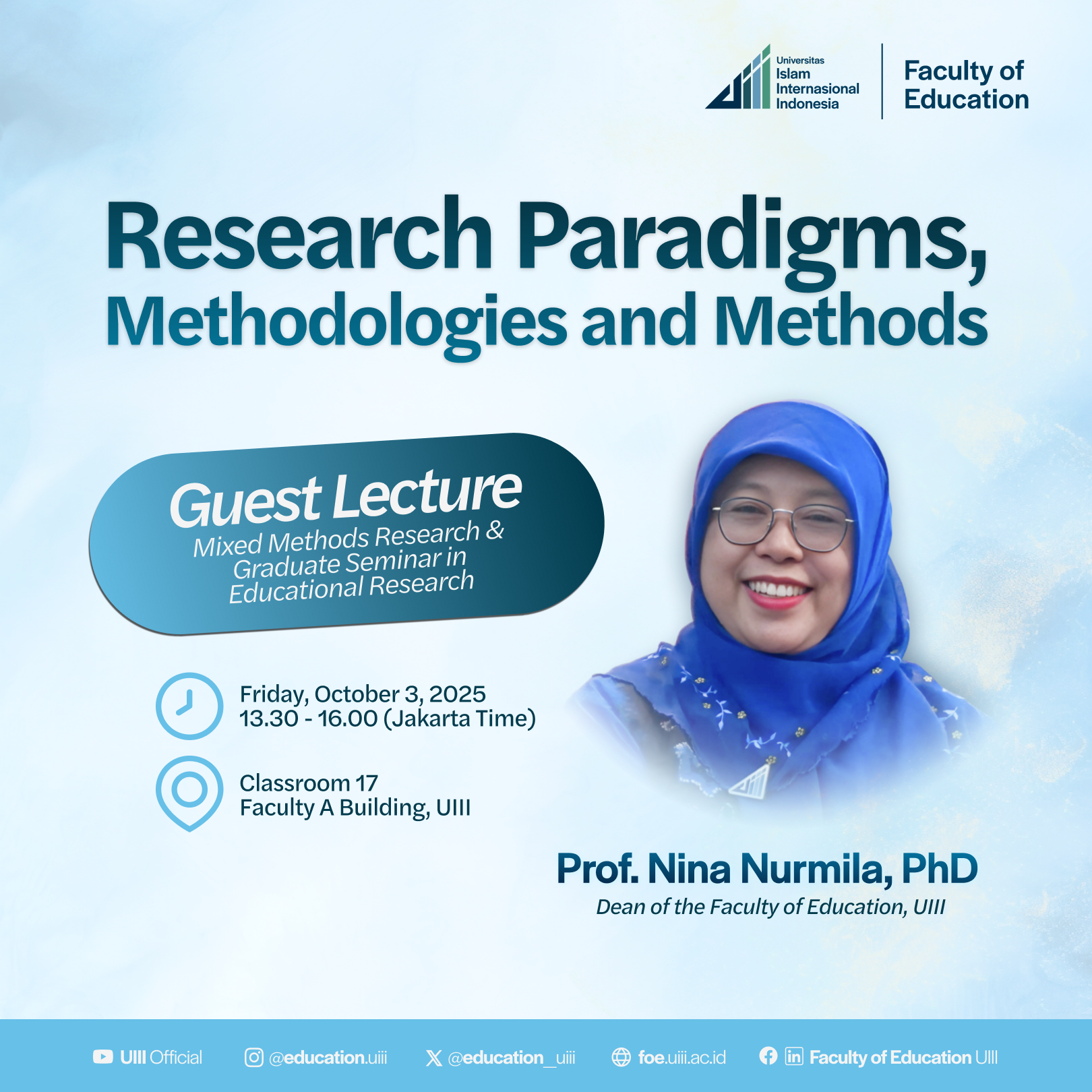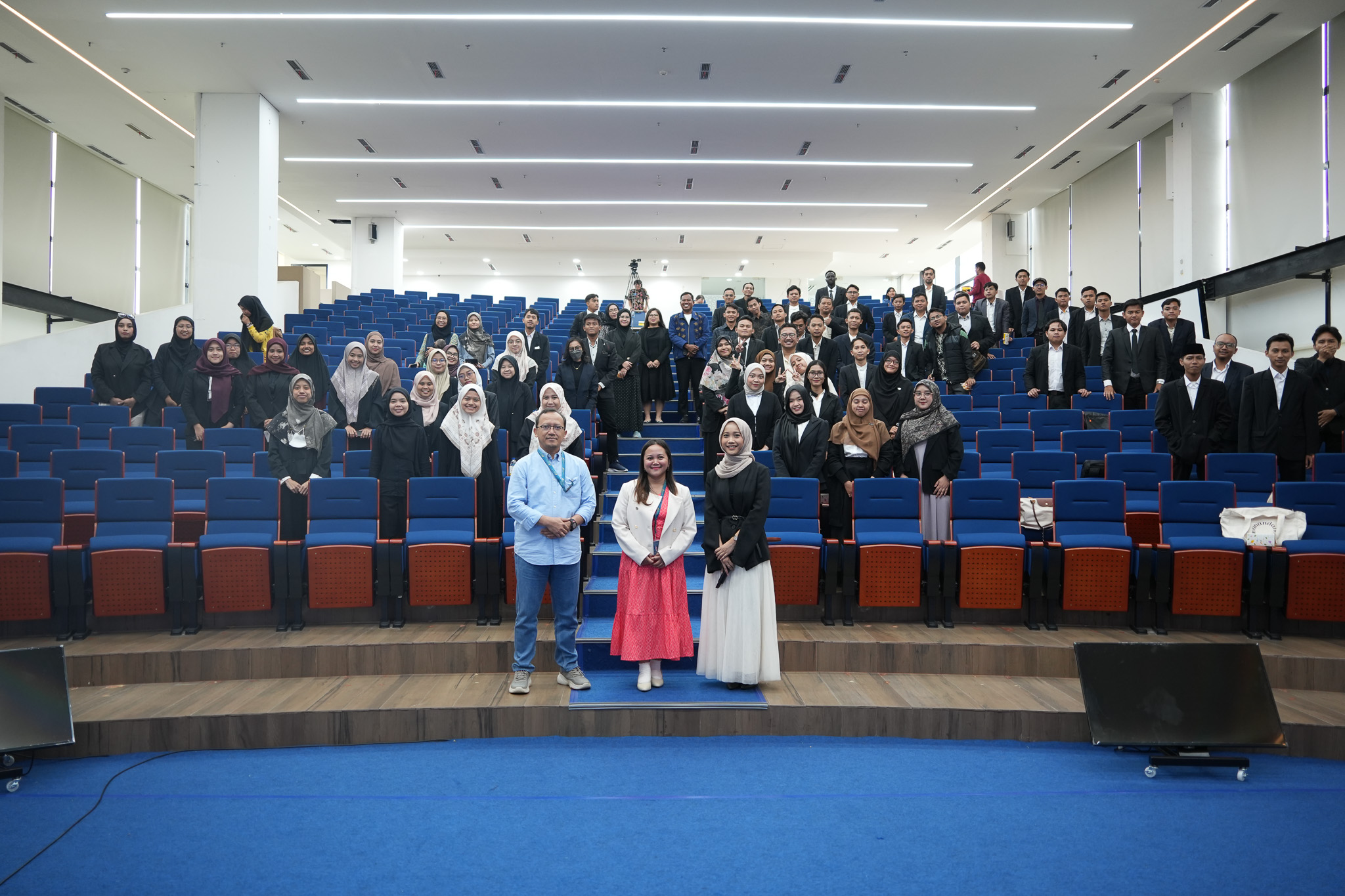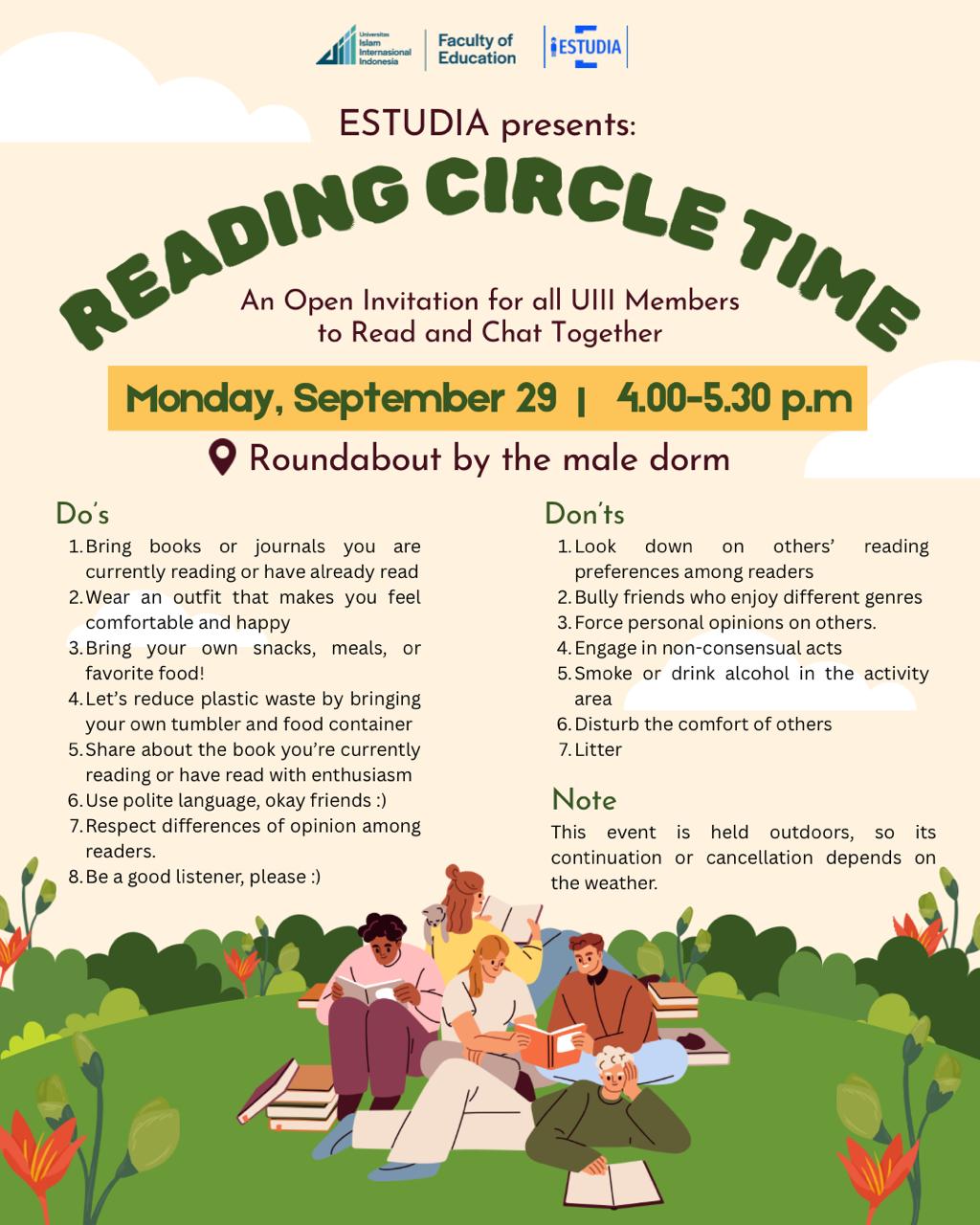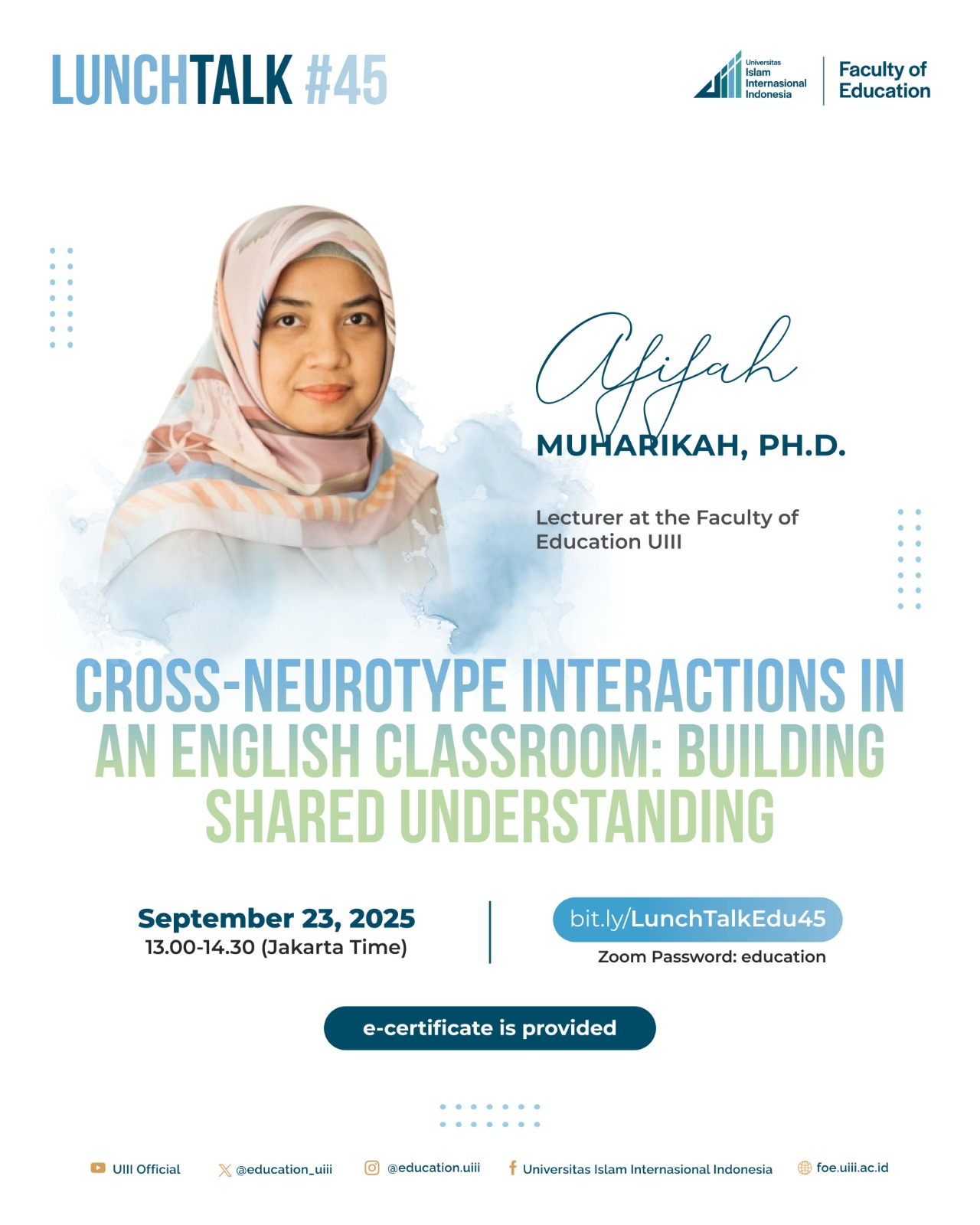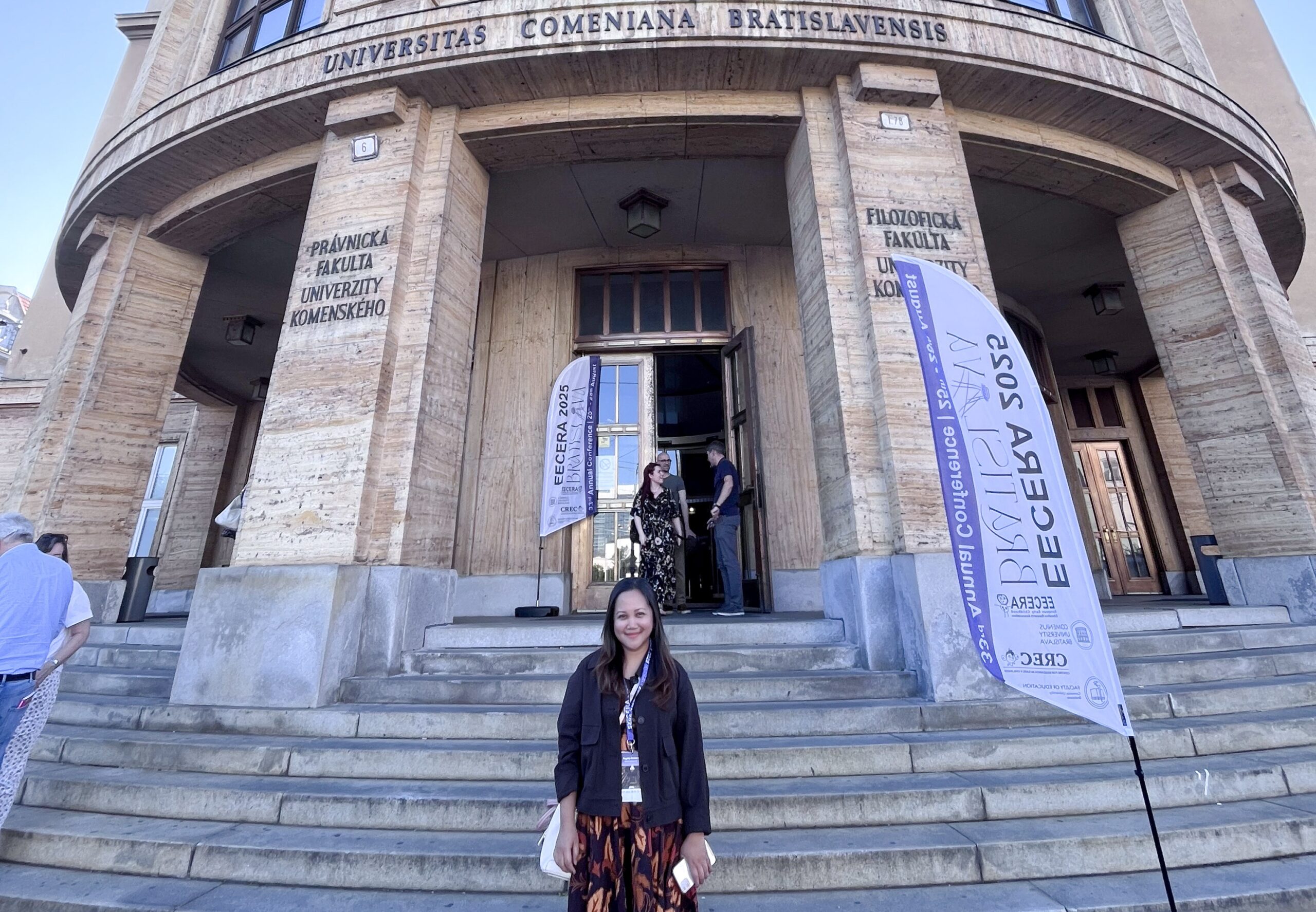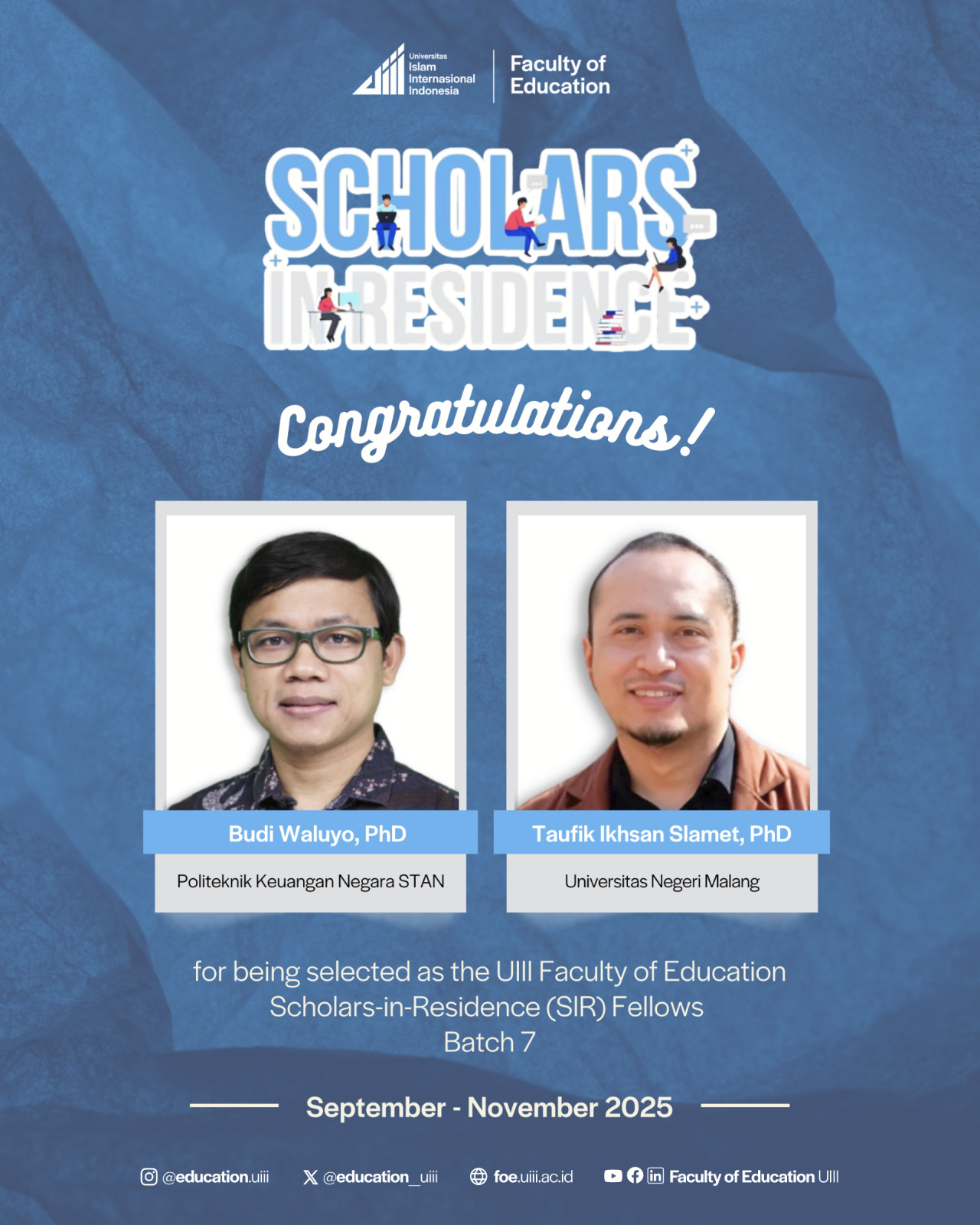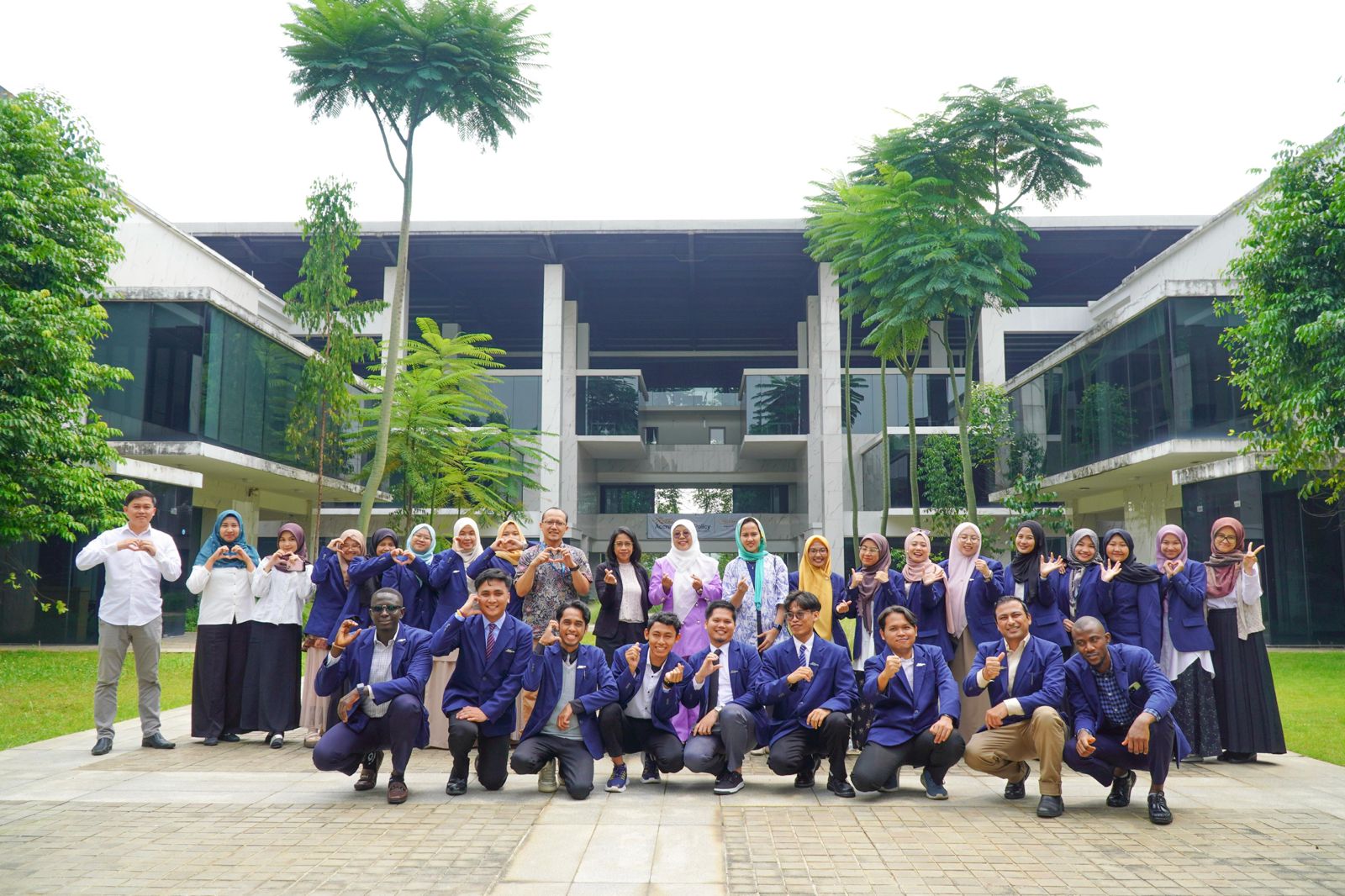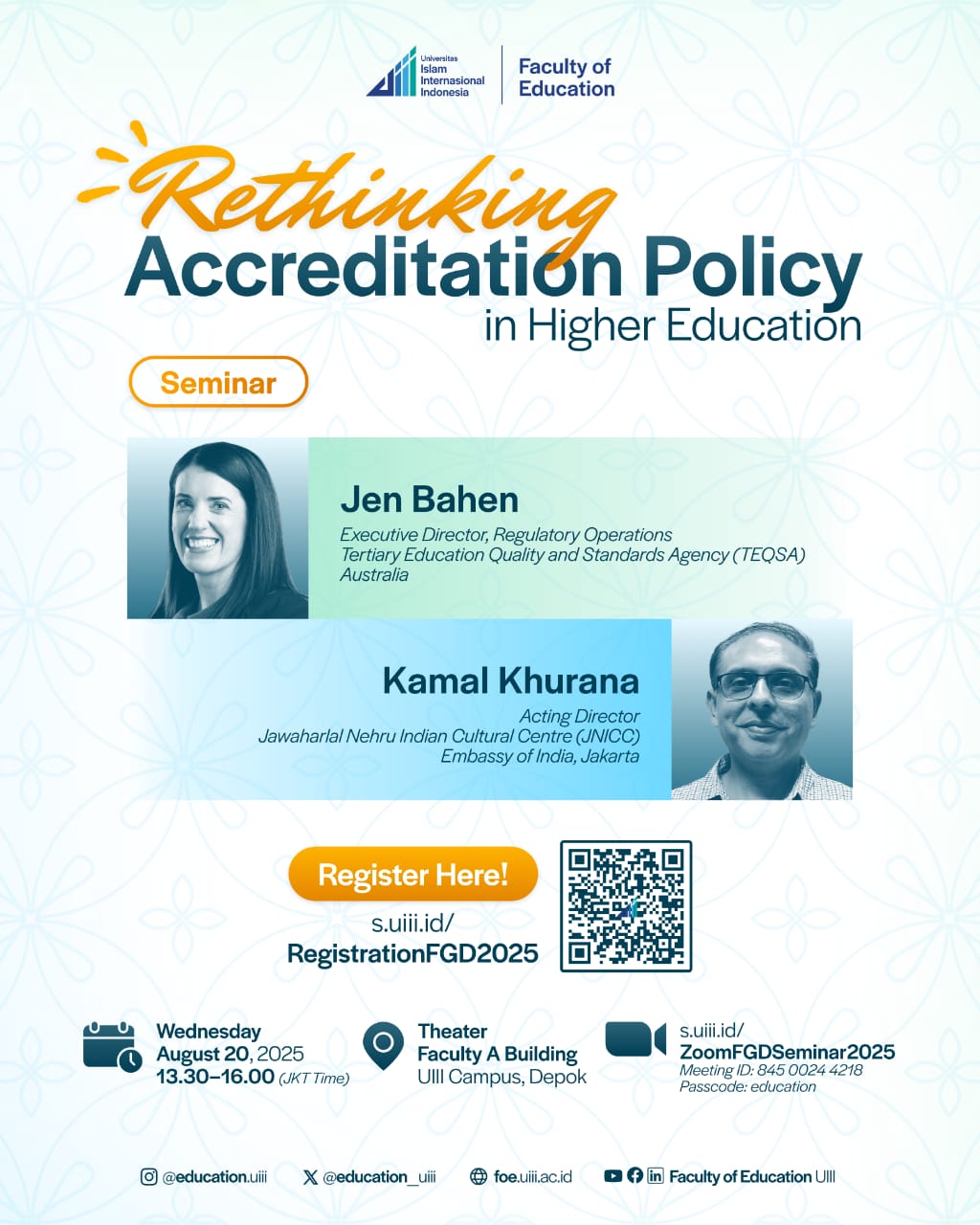Meet the Guardians of Wellbeing at UIII: Introducing the Counseling and Mental Health Services (CMHS)

Meet the Guardians of Wellbeing at UIII: Introducing the Counseling and Mental Health Services (CMHS)
September 23, 2025
Contributor: Supriyono | Editor: Dadi Darmadi | Photo: Achmad Jatnika
The journey of postgraduate study is often spoken of in bright terms—academic achievements, inspiring intellectual discussions, and promising futures. Yet beneath that surface, the lived reality can be far tougher. Endless assignments, the pull of family responsibilities, financial pressures, and the loneliness of being away from home can leave students quietly overwhelmed.
However, here at Universitas Islam Internasional Indonesia (UIII), we care about you, your mental health, and your overall wellbeing. Closing this year’s Orientation Week (O-Week) on Friday, September 19, 2025, two faculty members from the Faculty of Education—Dr. Lukman Nul Hakim and Assoc. Prof. Charyna Ayu Rizkyanti—addressed new students on an often-unspoken yet critical issue: mental health and counseling.
The session specifically introduced UIII’s Counseling and Mental Health Services (CMHS), a division under the university that provides psychological services. This unit is designed as a safe and inclusive space that respects diversity in culture, gender, and individual backgrounds. The service is open to all members of the academic community—students, faculty, and staff.
“Our approach is promotive, preventive, curative, and rehabilitative,” said Dr. Lukman, the Chair of CMHS. “We run mental health campaigns, psychoeducation sessions, and screenings; provide individual and group counseling; and connect students to external services when needed.”
The counseling services are located at the Faculty of Education in the Faculty A compound (first and third floors). They are available during working hours, and students, staff, and faculty members can access them by booking an appointment through the CMHS application. “Seeking help is an act of courage, not a sign of weakness. So never hesitate to reach out to us—we are here to support you,” Dr. Lukman said.
Meanwhile, Assoc. Prof. Charyna emphasized what these services mean in the day-to-day reality of student life. “We know that postgraduate study is hard, but it is not meant to break you,” she said. “The pressure of assignments, the personal struggles, even the loneliness—they can feel overwhelming. But these challenges are also opportunities to discover your strength and resilience. What matters most is that you don’t go through them alone, because here at UIII, we care about your wellbeing.”
She added that that well-being is not about avoiding challenges, but about how we respond to them. “When you can maintain your well-being, all those challenges can be accepted and understood as part of your life. You may feel sad, but you don’t stay in sadness; you may feel despair, but you still keep moving forward. If you are in that state, it means you are flourishing. You don’t only survive, but you thrive—growing, enjoying the process, and living with meaning.”
At UIII, we believe that academic success and personal well-being go hand in hand. By providing accessible counseling services, supportive programs, and a community that truly listens, we strive to ensure that no student walks this journey alone. Because here, your mental health matters just as much as your academic achievement.

Reading Circle Time with Estudia

?✨ Reading Circle Time with Estudia ✨?
We’re excited to announce the return of Reading Circle Time as the new semester begins! A special welcome to all new UIII students—this is the perfect chance to meet friends, relax, and share your favorite reads.
? When?
Monday, September 29
? What time?
4:00 – 4:30 p.m. Silent reading
4:30 – 5:30 p.m. Book discussion
? Where?
UIII roundabout by the male dorm
? Who can join?
Open to all UIII civitas: students, faculty, and staff are welcome!
New students—this is a great chance to meet friends and start your semester with inspiring conversations.
? What to bring?
A book or journal you're currently into or have finished
Snacks, meals, or your favorite treat
Your tumbler and food container (let’s go green!)
Comfy clothes that make you feel good
Your bright smile and open mind ?
? Let’s create a space where everyone feels heard and appreciated. Be kind, be curious, and let the stories flow!
? Let’s read, share, and grow together—old and new friends alike. See you there!
Lunch Talk #45: Cross-neurotype Interactions in an English Classroom: Building Shared Understanding

You are invited to join the Lunch Talk #45 at the Faculty of Education, UIII
Afifah Muharikah, S.S., M.Hum., PhD. (Lecturer at the Faculty of Education UIII) will share about: "Cross-neurotype Interactions in an English Classroom: Building Shared Understanding".
This lunchtime talk draws on classroom research with autistic and non-autistic students learning English together. It highlights how “neuro-mixed” interactions transform potential misunderstandings into opportunities for negotiation of meaning. The session demonstrates not only the communicative strategies employed by students but also the pedagogical value of communication diversity. Practical implications will be shared for fostering more inclusive and effective learning environments.
Key insights include:
1. Identifying strategies students employ to resolve communication breakdowns
2. Recognizing communication diversity as a pedagogical resource
3. Applying inclusive practices that enhance classroom interaction
Day/Date: Tuesday/September 23, 2025
Time: 13.00-14.30 (Jakarta Time)
Place: Theater, Faculty A Building
Online participation:
https://bit.ly/LunchTalkEdu45
E-Certificate is provided
Thank you!
Recorded on YouTube
https://www.youtube.com/watch?v=YP96Uo3wte8
UIII Scholars Share Groundbreaking Research at the 33rd EECERA Annual Conference in Slovakia

UIII Scholars Share Groundbreaking Research at the 33rd EECERA Annual Conference in Slovakia
September 2, 2025
Contributor: Supriyono | Editor: Dadi Darmadi | Photo: Charyna Ayu Rizkyanti
Bratislava, Slovakia — Two representatives from UIII brought fresh insights on empathy, wellbeing, and diversity in early childhood education (ECE) to the global stage at the 33rd Annual Conference of the European Early Childhood Education Research Association (EECERA), held from August 25–28, 2025, at the Faculty of Arts, Comenius University, Bratislava.
Assoc. Prof. Charyna Ayu Rizkyanti, lecturer at the Faculty of Education, and Syifa Mufiedatussalam, a PhD candidate at the Faculty of Education, joined hundreds of international scholars at this year’s event, themed “Early Education for All: Celebrating Diversity and Seeking Inclusion.”
Assoc. Prof. Charyna presented two of her recent studies across different symposium sessions, namely Symposium Set A themed ‘Children’s Behaviour and Teacher Empathy’. Held on August 26, 2025, she delivered a presentation titled “Striking the Right Balance: How Empathy Shapes Gen Z Early Childhood Teachers.”
 The next day on August 27, 2025, Assoc. Prof. Charyna presented at the Symposium Set E themed ‘Teacher Empathy, Emotions, and Expectations’. In this session, she delivered a compelling topic of “Valuing Diversity in ECE through Teacher Empathy: A Mixed-Method Study”, a collaborative project she conducted with Popi Rosepti, an UIII alumna from the first-batch MA student at the Faculty of Education.
The next day on August 27, 2025, Assoc. Prof. Charyna presented at the Symposium Set E themed ‘Teacher Empathy, Emotions, and Expectations’. In this session, she delivered a compelling topic of “Valuing Diversity in ECE through Teacher Empathy: A Mixed-Method Study”, a collaborative project she conducted with Popi Rosepti, an UIII alumna from the first-batch MA student at the Faculty of Education.
Meanwhile, Syifa Mufiedatussalam presented her doctoral research under Symposium Set F themed ‘Teacher’s Wellbeing’ on August 27, 2025. Her presentation was titled “How well are you, dear early childhood teacher?” Her presentation highlighted the pressing importance of supporting teacher wellbeing as a foundation for inclusive and high-quality early childhood education.
Both presenters received strong appreciation from participants and opened doors for international collaboration, including book projects, joint research, and academic partnerships with institutions across Europe and beyond.
Beyond paper presentations, Assoc. Prof. Charyna and Syifa engaged in active networking with global experts. They had the opportunity to meet directly with Prof. Dr. Christine Pascal, OBE, President of EECERA, and Prof. Dr. Tony Bertram, Editor-in-Chief of the European Early Childhood Education Research Journal (EECRJ). Discussions also explored the possibility of Assoc. Prof. Charyna serving as an EECERA country coordinator for Indonesia and contributing as a reviewer for EECRJ, a leading SSCI-rated journal.
Reflecting on their participation, the UIII delegation expressed hope that their contributions will strengthen Indonesia’s voice in international academic conversations on early childhood education. “We believe our work can support broader efforts to advance inclusive, empathetic, and sustainable practices in ECE,” said Assoc. Prof. Charyna.
 The EECERA Annual Conference, recognized as one of the largest gatherings of early childhood education researchers worldwide, continues to serve as a vital arena for dialogue, critical inquiry, and collaboration. This year’s theme underscored the urgency of building educational systems that embrace diversity, support teacher wellbeing, and uphold the rights of every child.
The EECERA Annual Conference, recognized as one of the largest gatherings of early childhood education researchers worldwide, continues to serve as a vital arena for dialogue, critical inquiry, and collaboration. This year’s theme underscored the urgency of building educational systems that embrace diversity, support teacher wellbeing, and uphold the rights of every child.
Scholars-in-Residence (SIR) Fellows Batch 7, Faculty of Education UIII

Scholars-in-Residence (SIR) Fellows batch 7, Faculty of Education - UIII
The Faculty of Education is delighted to introduce and announce the result of the Scholars-in-Residence (SIR) Program (Batch 7 for September – November, 2025). Theya are: Budi Waluyo, PhD (from Politeknik Keuangan Negara STAN) and Taufik Ikhsan Slamet, PhD (Universitas Negeri Malang). Both of them will be participated in many academic activities in the faculty, such as a guest lecturer in MA and PhD courses, giving seminar in Lunch Talk series, open for discussion and consultation for MA and PhD students in the faculty, as well as in social activities too. Welcome Pak Budi and Pak Taufik.
Muhammadiyah Bugis-Makassar: Dispersal of Muslim Organizations in and from South Sulawesi
 Halim, W., & Nubowo, A. (2025). Muhammadiyah Bugis-Makassar: Dispersal of Muslim Organizations in and from South Sulawesi, Indonesia . Studia Islamika, 32(2), 313–346. https://doi.org/10.36712/sdi.v32i2.4254
Halim, W., & Nubowo, A. (2025). Muhammadiyah Bugis-Makassar: Dispersal of Muslim Organizations in and from South Sulawesi, Indonesia . Studia Islamika, 32(2), 313–346. https://doi.org/10.36712/sdi.v32i2.4254
Abstract
This study examines the dispersal of Islamic authority within Muhammadiyah in South Sulawesi and how local cultural values influence Islamic reformism. It highlights the emergence of new organizations such as Darul Istiqamah, Hidayatullah, and Wahdah Islamiyah, founded by Muhammadiyah activists with distinct institutional paths. These organizations emerged through ideological shift, cultural entrepreneurship, and political opportunity. Bugis-Makassar values, particularly siri’ (shame and dignity) and pessé/paccé (solidarity), promote independent leadership and institutional creation over internal compromise. Drawing on political opportunity, resource mobilization, and sectarianization theories, the study shows that religious authority dispersal is shaped by local socio-cultural logics. The Darul Islam movement’s legacy further supports more rigid reformist visions. Rather than fragmentation, this process reflects culturally mediated adaptation and innovation. The concept of “Muhammadiyah Bugis-Makassar” illustrates how local cultural dynamics catalyze Islamic reform into networked activism, where regional values reshape organizational boundaries and influence broader Islamic movements. This framework offers insights into cultural mediation of Islamic reform trajectories across Indonesia.
164 Graduates, 18 Countries, One World: The 3rd UIII Commencement Ceremony

164 Graduates, 18 Countries, One World: The 3rd UIII Commencement Ceremony
August 27, 2025
Contributor: Supriyono | Editor: Dadi Darmadi | Photo: Achmad Jatnika
Depok, 27 August 2025 – Universitas Islam Internasional Indonesia (UIII) proudly held its third commencement ceremony, celebrating the graduation of 164 students from 18 different countries, marking another milestone in the university’s growing global academic community.
This year’s graduates comprise 105 Indonesian nationals and 59 international students, reflecting UIII’s vision as a hub for international higher education. The Class of 2025 represents UIII’s truly international character, with graduates hailing from Indonesia, Afghanistan, Gambia, Yemen, Bangladesh, the Philippines, Kazakhstan, Ghana, Morocco, Nigeria, Pakistan, Egypt, Sudan, Uzbekistan, Tanzania, Malawi, Kenya, and Thailand.
From the academic divisions, the graduates represent the Faculty of Islamic Studies (55), Faculty of Social Sciences (37), Faculty of Economics and Business (46), and Faculty of Education (26). Among them are 14 students of the Dual Degree Program—8 with the University of Edinburgh and 6 with SOAS University of London—demonstrating UIII’s strong international partnerships.
In his commencement address, Prof. Jamhari, Rector of UIII, congratulated the graduates and emphasized the significance of their achievements. “Today is not only a celebration of academic success but also a testimony to the international spirit of UIII. Our graduates come from 18 countries, carrying with them the mission to contribute positively to their societies and to the global community. UIII stands as a bridge between Indonesia and the world, and you are the ambassadors of that mission.”
Dr. Phil. Syafiq Hasyim, Vice Rector for Academic Affairs, highlighted the role of UIII graduates in shaping the future of global education and leadership. “This commencement proves that UIII is steadily realizing its goal of becoming a world-class university. Our students have been trained not only with knowledge but also with values of inclusivity, dialogue, and humanity. As they return to their countries or continue their careers, we trust they will be change-makers who embody the vision of UIII.”
Since its first commencement in 2023, UIII has continued to expand its academic reach. The first batch in 2023 produced 72 graduates from 13 countries, followed by 88 graduates from 13 countries in 2024. With the addition of this year’s 164 graduates, UIII now proudly counts a total of 324 alumni from 27 countries worldwide.
The countries include Afghanistan, Algeria, Bangladesh, Cameroon, Egypt, Gambia, Ghana, India, Indonesia, Ivory Coast, Kazakhstan, Kenya, Malawi, Morocco, Nepal, Nigeria, Pakistan, Philippines, Somalia, Sudan, Tanzania, Thailand, Timor-Leste, Togo, Tunisia, Uzbekistan, Yemen.
The graduation ceremony this year was attended by ambassadors and representatives from several countries, including Afghanistan, Pakistan, Uzbekistan, Nigeria, Sudan, and the Philippines. Their presence highlighted the significance of the event and underscored the spirit of international friendship and cooperation.
Reflecting on UIII’s broader mission, Prof. Jamhari added: “UIII not only serves as an academic institution but also carries a diplomatic mission. I expect our graduates to contribute meaningfully in their respective countries while maintaining a strong bond with Indonesia in general, and with UIII in particular. Education has the power to unite people across differences, and UIII is committed to nurturing that unity.”
This consistent growth highlights UIII’s rapid development as a center of excellence. Since its establishment, UIII has emerged as a global hub of Islamic higher education, offering not only academic rigor but also a platform for international collaboration, cultural dialogue, and intellectual exchange that connects Indonesia with the wider world.
source: https://uiii.ac.id/164-graduates-18-countries-one-world-the-3rd-uiii-commencement-ceremony/
FoE Celebrates 2025 Judicium Ceremony, Honoring Best Graduate and Best Thesis Awards
FoE Celebrates 2025 Judicium Ceremony, Honoring Best Graduate and Best Thesis Awards
August 26, 2025
Contributor: Supriyono | Editor: Dadi Darmadi | Photo: Virda L. Umam
The Faculty of Education at Universitas Islam Internasional Indonesia (UIII) held its Judicium Ceremony on August 25, 2025, marking an important milestone for graduating students as they embark on the next chapter of their academic and professional journeys.
During the ceremony, two outstanding students were honored for their exceptional achievements. Muhamad Maulana was named Best Graduate with a perfect GPA of 4.00, reflecting his consistent dedication and academic excellence throughout his studies.

Meanwhile, Karamo Ceesay received the Best Thesis Award for his research titled “Exploring Parental Involvement in Student’s Academic Achievement: A Case Study of Public Primary Schools in Rural Gambia”, which earned an impressive score of 96.67.

Prof. Nina Nurmila, Dean of the Faculty of Education praised the graduates for their hard work and commitment. “This judicium is not just a celebration of academic success but also a testament to the resilience and passion of our students. We are confident that our graduates will continue to contribute meaningfully to education and society,” she stated.
The ceremony concluded with reflections on the Faculty’s vision to nurture globally competitive scholars and educators, reinforcing UIII’s commitment to advancing education rooted in academic rigor and social responsibility.
Seminar: RETHINKING ACCREDITATION POLICY IN HIGHER EDUCATION

Seminar: RETHINKING ACCREDITATION POLICY IN HIGHER EDUCATION
The topic of accreditation within Indonesian higher education has been an ongoing discussion in line with educational reforms—whether to maintain the current hierarchical categories of “Baik (good), Baik Sekali (very good), Unggul (outstanding)” or to adopt a binary accreditation system of “Accredited” and “Not Accredited.”
In response to this discourse, the Faculty of Education at Universitas Islam Internasional Indonesia gladly invites you to join our seminar under the theme “Rethinking Accreditation Policy in Higher Education”. This Seminar will feature speakers from Australia and India representative share their insights and experiences about accreditation policies.
This event will be held on:
? Wednesday, August 20, 2025
? 13.30-16.00 (Jakarta time)
? Theater, Faculty A Building
Please RSVP through the following link:
? s.uiii.id/ZoomFGDSeminar2025
#Education #Accreditation
#UniversitasIslamInternasionalIndonesia
Recorded on YouTube
https://www.youtube.com/watch?v=ezTvoyOrbjo

